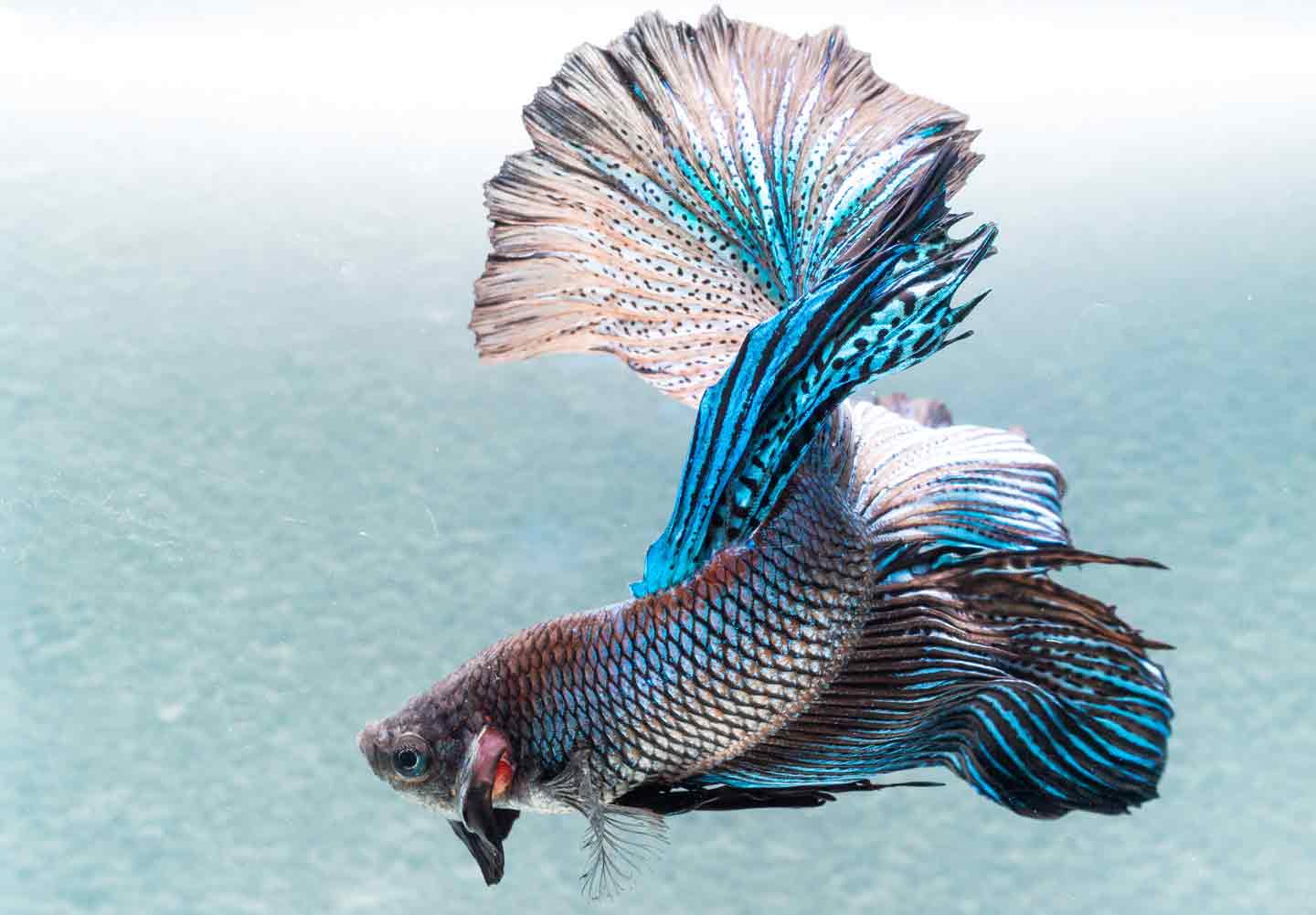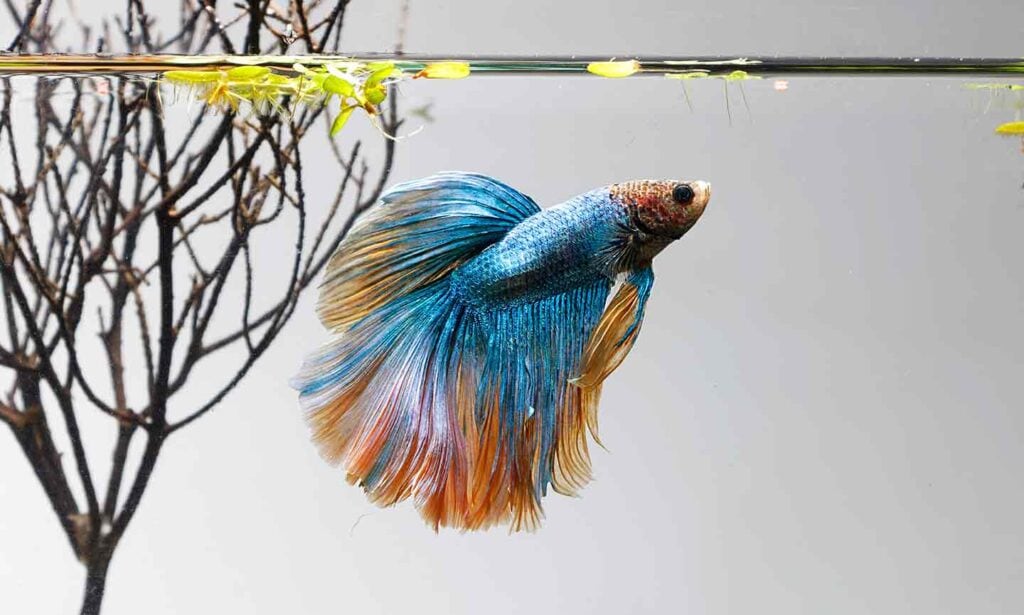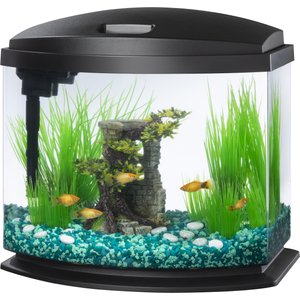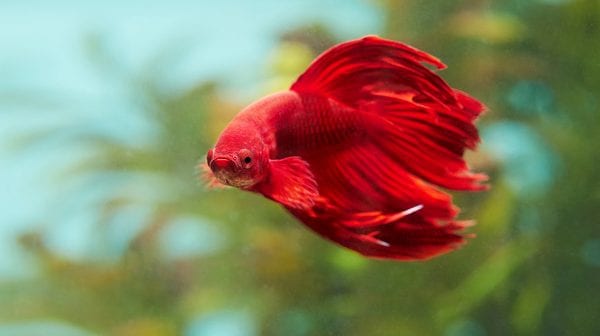How Long Do Betta Fish Live?
The average lifespan for bettas is 5–7 years—but that lifespan can vary widely, depending on factors like:
- Wild vs. captive: Wild Betta splendens bear little resemblance to their captive-bred counterparts popular in the aquarium trade. Fish in the wild are subject to predators and other dangers they wouldn’t experience in a home fish tank, which may shorten their lifespan.
- Breeding: Decades of selective breeding have transformed the betta from a neutral-colored, short-finned species into a vast array of vibrantly colored varieties with fins of all sizes, shapes, and lengths—but issues of inbreeding may result in a shorter lifespan for some fish.
- Care and keeping: In the home aquarium, key factors that affect longevity include suitability of the environment, adequacy of the diet, and protection against disease.
To a certain extent, the amount of time you have with your betta fish comes down to luck. When you purchase a betta, you may not get any information about the fish’s genetics or even their age. The betta you bring home could already be 6–12 months old.
7 Tips To Increase Your Betta’s Longevity

The best way to maximize betta fish lifespan is to start with the healthiest fish possible. If you’re purchasing from a breeder, be sure to see the specific fish in person before you buy. Purchasing from a local fish store may give you access to a wider selection, though the conditions in which the fish is kept prior to sale—often in overcrowded tanks or too-small individual cups—may shorten their longevity.
When selecting your betta fish, look for signs of good health such as:
- Active, responsive behavior
- Healthy fins; no tears or signs of fungus
- Strong coloration
- Clear eyes
- Smooth scales; no signs of bloating
Once you bring your healthy betta fish home, here are some tips to help ensure they live happily into old age.
1 Choose the Right Tank Size
It’s a common misconception that betta fish can thrive in small, unfiltered fish bowls. In reality, betta fish need at least a 5-gallon tank with proper filtration. Water quality is easier to maintain in larger tanks because the increased water volume helps minimize fluctuations in water chemistry that might harm your betta. Go for the largest tank size you can afford and maintain.
2 Cycle the Tank First
Don’t bring your betta home on the same day you purchase your fish tank. It can take several weeks for a colony of beneficial bacteria to become established in your tank. These bacteria are necessary to facilitate the nitrogen cycle: the process through which organic waste breaks down and gets converted from toxic by-products into chemicals that are less harmful to aquarium fish. You can speed up the cycling of your betta fish tank by treating it with a beneficial bacteria starter.
3 Select the Right Tank Mates
“Male betta fish should be housed individually or with a community in a larger aquarium with non-aggressive species of fish,” says Teresa Manucy, DVM, a Chewy veterinarian. Male bettas are highly territorial with their own species and may also react negatively to tropical fish similar in appearance—like fancy guppies.
Female betta fish are generally a better fit for a community tank setup, Dr. Manucy says. “Female bettas may be housed with a community of other smaller fish species or other female bettas in a large enough aquarium.”
Choosing the right betta fish tank mates is key to minimizing stress, which can impact your betta’s susceptibility to disease and shorten their lifespan.
4 Offer a Balanced Diet and Avoid Overfeeding
Wild betta fish are primarily insectivorous but will also eat small snails, crustaceans, and even smaller fish. Feed your betta a high-quality staple diet of commercial pellets formulated specifically for carnivores or betta fish.
You’ll only need to offer a few small pellets a day because fish food for bettas is very nutrient- and calorie-dense. If you supplement your betta’s diet with frozen, freeze-dried or live food like brine shrimp or bloodworms, substitute it for the pellets one or two times per week.
5 Monitor and Maintain Water Quality
Dr. Manucy recommends equipping betta tanks with a low-flow filter to keep water quality high and minimize the need for water changes. Test your tank water weekly to monitor levels of ammonia, nitrites, and nitrates. When performing regular water changes, treat your tap water with water conditioner to neutralize toxins and heavy metals that could harm your betta.
If you want your betta to have a healthy life, consider stocking your tank with detritivores like snails to help clean up uneaten fish food that might negatively impact water quality. Live plants can also help improve water quality by increasing oxygen levels and absorbing excess nitrogen compounds.
6 Minimize Stress
Along with providing a healthy diet and clean tank, responsible betta fish care involves minimizing stress, which can be exacerbated by an unsuitable environment.
“Use of an aquarium heater will ensure the water temperature will not vary more than two degrees Fahrenheit,” Dr. Manucy says, adding that gentle filtration systems, like sponge filters, can help minimize stress. With their long fins, betta fish can become overtired fighting against strong currents.
Avoid overfilling your tank as well. Like other members of the anabantoid group, betta fish have a labyrinth organ that enables them to breathe air. “To allow for this,” says Dr. Manucy, “there must be space at the top of the aquarium below the lid for them to surface and breathe.”
7 Treat Illnesses Promptly
Jessie Sanders, DVM, DABVP (Fish Practice), owner and chief veterinarian of Aquatic Veterinary Services in Santa Cruz County, California, recommends taking a proactive approach to protecting fish health. When purchasing new fish, “Proper quarantine is the best method to prevent the spread of disease into the larger system,” she says.
If your fish is sick, place them in a quarantine tank to separate them from the other animals in your tank. Keep a stock of basic fish medications on hand as well so you can promptly treat illnesses that might affect your betta’s lifespan.
As you and your betta get to know each other, you may come to find your new fish has a personality of their own. Spending a few minutes each day observing your betta helps you establish a baseline for their normal behavior so you can spot the signs of illness early.
More About Bettas
Share:














